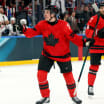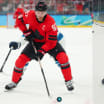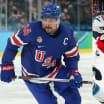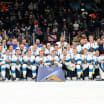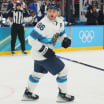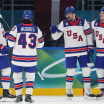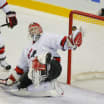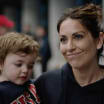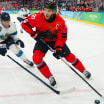LAVAL, Quebec --Claude Vilgrain walked into the Haiti men's ball hockey team's locker room for the first time as a consultant for the 2022 International Street and Ball Hockey Federation World Ball Hockey Championships and saw something he had never seen in his 51 years of playing hockey.
Vilgrain inspired, instilled pride in Haiti ball hockey team
Only NHL player from Caribbean nation was consultant at 2022 world championships
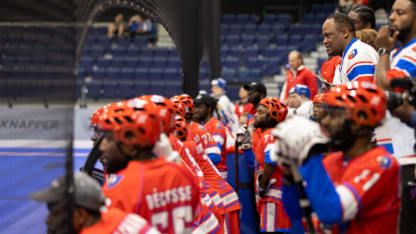
By
Jackie Spiegel
NHL.com Staff Writer
The 59-year-old former NHL forward, who was drafted by the Detroit Red Wings and played 89 games for the Vancouver Canucks, New Jersey Devils and Philadelphia Flyers, stood in front of a locker room filled with only Black players.
It was a special moment for Vilgrain, who said he was usually the only Black player on a team. It was special for the players too, because he is the only NHL player to be born in Haiti.
After his family moved to Quebec, Vilgrain was first introduced to the sport at the age of 8 through a table hockey game he received as a birthday present from an uncle. He recalls watching a game between the Montreal Canadiens and Chicago Blackhawks that March -- he said he originally thought the "CH" on the Canadiens jersey stood for Chicago -- and he told his parents he wanted to play. He spent the summer playing ball hockey, signed up for ice hockey in the fall and, as he said, the rest is history.
Vilgrain grew up wanting to be Canadiens legend Guy Lafleur. Growing up in Montreal, Ainslie Bien-Aime dreamed of being Vilgrain.
"Claude's very humble," said Bien-Aime, a former Haiti captain and its current general manager. "Claude's been in the NHL. Outside of the rink, he's been through a lot [in hockey], so he brings that energy, brings that experience in the locker room, and the fact that he played in the NHL, [he brings] a lot of respect in the room."
Vilgrain knows a thing or two about playing in a short tournament like the world championships. He played for fourth-place Canada at the 1988 Calgary Olympics, won back-to-back championships with Canada at the Spengler Cup in 1996 and 1997 and coached youth hockey teams in the Alberta Cup. He also drew on his history of playing in Laval, where the tournament was held. He played three seasons with the Voisins of the Quebec Major Junior Hockey League, scoring 126 points (46 goals, 80 assists) in 69 games in 1982-83. He was named a second-team All-Star with teammates Mario Lemieux and Bobby Dollas.
During Haiti's Group A game against the Czech Republic at Place Bell, Vilgrain stood on the bench with his arms folded and didn't appear to say much. Bien-Aime called him a calming presence. Assistant captain Steven Jean-Denis said he brought that, along with strategy and tactical tips.
"There's not a message [I give them]. It's performance-on-demand," Vilgrain told NHL.com. "I tell them the first shift can cost you the tournament. Be disciplined, stay away from penalties, leave your egos at the door and play as a team and every shift counts."
The tournament didn't go as expected for Haiti, finishing last out of eight teams in Group A while losing some players and staff due to coronavirus concerns. The expectations had been high after the team won the Group B championship in 2015 with former NHL forward Georges Laraque as an assistant coach.
"[Representation is] very important," Vilgrain said regarding Haiti having a ball hockey team. "I know when they went over to Switzerland [in 2015], they thought they were the halftime show. But they got a chip on the shoulder and they won the tournament, so it is important. I look at the crest, I look at the flag with the hockey sticks, and these guys, these guys are proud. They want to do well. They want to represent well."
When the thought of building a national team to compete in 2015 was being tossed around, more than 75 Haitian players showed up for training camp. It was a defining moment for Bien-Aime, who had played for Canada and won the 2007 world championships.
"I had never played with so many Black people," Bien-Aime said.
The turnout sealed the deal to create the team and reaffirmed his belief that hockey is truly a sport for everyone.
Today, the Haiti team is mostly comprised of Canada-based heritage players, meaning they are the descendants of a parent or grandparent born in the country; however, they did receive authorization from the Haitian embassy to compete under the flag. The hope is one day the team will be comprised of players who are living in Haiti. According to Bien-Aime, the objective is that by 2023 they will be able to bring ball hockey clinics and workshops to the Caribbean nation and that by 2026 there will be programs in place to build the roster.
Vilgrain lives in Calgary, where in addition to coaching and doing skills development work, he designs parks and playgrounds. Though this may have been his first world championship working with the Haiti ball hockey team, he helped build the foundation for these players and future generations to play the sport.
"He's a model, he's an inspiration," Jean-Denis said. "The fact that he did this [and made it to the NHL], it makes us believe, makes us believe that we can do something, we can do something big, and we have the heart to do it. He's like us. He's one of us. He started it, so we're going to continue the movement."
Photo courtesy: ISBHF
